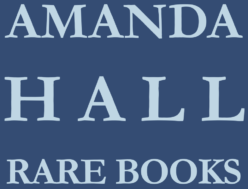By the King. A Proclamation for apprehending certain Persons therein Named, Accused of High Treason. Given at Our Court at Whitehall the fifteenth day of January 1678/9. In the Thirtieth year of Our Reign. God save the King. London, John Bill, 1678/9.
Folio broadside, (345 x 280mm), drop-head title under the royal arms, decorative initial, printed mostly in black letter, central fold, a good copy, manuscript shelf mark ‘(69)’.
A scarce proclamation that led to the arrest and wrongful execution of Blessed John Gavan (1640-1679). Born in London to a family originally from Wiltshire, Gavan was educated at the Jesuit College at St. Omer and returned to take up his mission in Staffordshire, one of the strongholds of the Catholic faith in England. He took his final vows in 1678 at Boscobel, home of the Penderell family. Soon afterwards Stephen Dugdale learnt of the ceremony and accused all those present of plotting to kill the king. Dugdale was a much more convincing talker than Titus Oates had been and his accusation was readily believed, resulting in this warrant for the arrest of those involved. Gavan fled to London where arrangements were being made to smuggle him out of England when he was denounced by a spy called Schibber and he was arrested on 29th January. During his trial on 13th June, Gavan proved himself an excellent speaker, exposing the inconsistencies of the case against him. Nonentheless a verdict of guilty was brought in and Gavan, along with four others, was condemned to death and executed at Tyburn on 20th June. A large crowd assembled for the execution and is said to have stood in respectful silence during the hour long speeches from the victims and the final act of contrition led by Gavan.
In addition to John Gavan, the proclamation calls for the arrest of several other Catholic priests, offers rewards for their apprehension and warns that anyone caught helping them will be guilty of high treason. The highest reward, of one hundred pounds, is offered for the capture of Francis Evers, alias Ewrie, alias Ireland. The other priests named on the document are Vavasor, alias Gifford, Edward Levison (Jesuits) and Broadstreet (’a Popish Priest’) for each of whom a reward of fifty pounds is offered. Each of the men listed are accused of being ‘guilty of late Damnable and Treasonable Plot for destruction of the Kings Royal Person, the Subversion of his Government, and for the Extirpation of the True Protestant Religion Established by Law within this Kingdom’.
‘And his Majesty doth hereby straitly forbid and prohibit any of his Subjects from Concealing, Sheltering, Relieving, or Receiving any of the said Offenders, under Peril of being themselves proceeded against (as by Law they may) for the Crime of High Treason’.
Francis Evers had known Stephen Dugdale in the early years after his conversion to Catholicism and before he became a key informer in the Popish Plot. Despite the generosity of the reward offered here, neither he nor Edward Leveson were taken. ‘Of seven other Jesuits living in Staffordshire during the Popish Plot frenzy only two avoided arrest, Francis Evers and Edward Leveson, despite a proclamation of 1679 putting a price of £100 on Evers and £50 on Leveson; Evers escaped to St. Omer for a time’ (Michael W. Greenslade, Catholic Staffordshire 1500-1850, p. 139).
ESTC r35887, listing ten copies in the UK and Folger, Harvard, Huntington, Penn and Yale in North America.
Wing C3436; Steele I, 3676.
